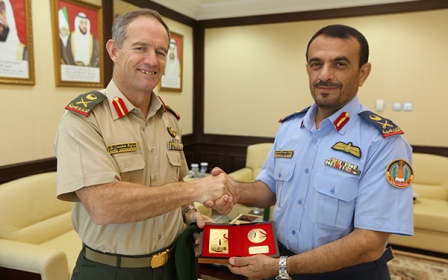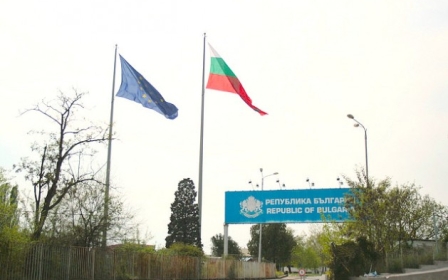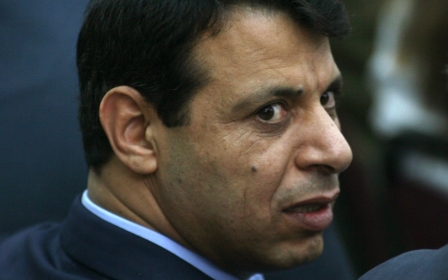Bulgaria sells arms to Saudi and UAE, likely for use in Syria war

SOFIA - Saudi Arabia and the United Arab Emirates have bought large quantities of Soviet-style weapons and ammunition from Bulgaria in the past two years, almost certainly destined for factions in Syria and possibly also Yemen, an investigation has revealed.
Bulgaria's annual report on defence industry exports shows the government approved munitions and military equipment sales to Saudi Arabia worth more than $92.7mn last year, with deals to the value of almost $31.6mn completed by the end of 2014, according to research by the Balkan Investigative Reporting Network (BIRN).
The Bulgarian government has also told BIRN that it issued permits for the sale this year of weapons to the UAE. It declined to state the value of these deals.
Bulgaria makes and stockpiles mainly Soviet-style arms. Analysts say it is highly unlikely Saudi Arabia or the UAE would buy these for their own forces, which use modern Western weapons, and it is therefore much more plausible they bought the munitions for local factions they back in Syria and Yemen, where Soviet-style arms are widely used.
A well-connected Bulgarian former military officer told BIRN the Saudi purchases were transported from Sofia by plane and were intended for Syrian fighters, with later shipments possibly also being used for Yemen.
Opposition fighters and independent analysts have also told BIRN that Bulgarian weapons are being used in Syria.
The Bulgarian government's report, which was published in August this year but has received no media coverage, says it issued permits for the sale of $71.3mn million worth of ammunition, $13.6mn of large calibre weapons and $5.4mn of small calibre weapons to Saudi Arabia.
A UN report listed 827 light machine guns and 120 SPG-9 recoilless anti-tank guns as part of Bulgaria’s arms exports to Saudi Arabia in 2014.
"This type of weapon is very unlikely to be used by the Saudi military, but it is very heavily used in Yemen, in Iraq and in Syria," said Ben Moores, a senior analyst at defence consultancy IHS Janes.
The Bulgarian government has also issued licences for the export of ammunition, firearms and defence equipment to the UAE this year, Bulgaria's Economy Ministry told BIRN.
Pieter Wezeman, a researcher at the Stockholm International Peace Research Institute, said "it doesn’t make sense" that the UAE would buy weapons and ammunition from Bulgaria for its own forces. He said he suspected these munitions would be diverted to either Syria or Yemen.
The Saudi and UAE embassies responsible for their affairs in Bulgaria did not respond to questions from BIRN. Bulgaria's Economy Ministry said it would not issue licenses for arms deals when concerns were raised about the possible diversion or re-export of the weapons.
A diplomatic cable in January 2010 from the US embassy in Sofia, published by WikiLeaks, said that Bulgaria consults with the US embassy on potentially controversial arms deals. Contacted by BIRN, the embassy declined to say whether it was aware of other countries buying Bulgarian weapons for use in Syria.
In the past year, the United States has itself purchased arms from Bulgaria as part of a $500-million programme to train and equip Syrian opposition forces that has now been abandoned. In June, the US embassy in Sofia admitted to the presence of US subcontractors for the train and equip programme in Bulgaria after an incident with an RPG-7 killed one of them at an arms testing ground near the Bulgarian city of Sopot.
A US government procurement database shows that Special Operations Command (SOCOM), which was in charge of the US military effort to assist Syrian fighters, awarded the subcontractors' employer Purple Shovel (a US-based defence contractor) a contract worth more than $26.7mn in December 2014 to supply foreign weapons and ammunition. Their country of origin is listed as Bulgaria.
The former Bulgarian military officer, who spoke on condition of anonymity, said the weapons purchased by Saudi Arabia were meant for Syrian armed groups opposed to Assad's regime. They were airlifted to the northern Saudi city of Tabuk and then transported to Jordanian-Syrian border, where they were passed on to the Syrian opposition armed groups, he said.
"Some of these weapons may have also been used for Yemen, as the later flights coincided with the beginning of the Saudi operation there," the former officer said.
Both Saudi Arabia and the UAE are part of a coalition in Yemen that has conducted air strikes, deployed ground forces and supplied weapons to local fighters with the aim of battling Shia forces known as Houthis. Riyadh was also involved in supplying weapons to Yemen before its own forces intervened there, Wezeman said.
Mariya Petkova is a Bulgarian journalist who covers stories in Eastern Europe, the Balkans and the Middle East. This article was produced as part of the Balkan Fellowship for Journalistic Excellence, supported by the ERSTE Foundation and Open Society Foundations, in cooperation with the Balkan Investigative Reporting Network. A more detailed version of this investigation is available here.
Middle East Eye propose une couverture et une analyse indépendantes et incomparables du Moyen-Orient, de l’Afrique du Nord et d’autres régions du monde. Pour en savoir plus sur la reprise de ce contenu et les frais qui s’appliquent, veuillez remplir ce formulaire [en anglais]. Pour en savoir plus sur MEE, cliquez ici [en anglais].




